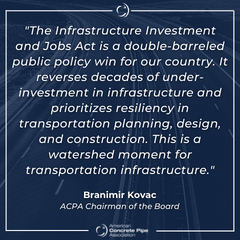Irving, Texas – November 6, 2021 – Late on November 5th, the U.S. House of Representatives voted to pass landmark infrastructure legislation, clearing the measure for the President’s signature.
The American Concrete Pipe Association (ACPA) applauds the Congress for taking this action. The legislation – called the “Infrastructure Investment and Jobs Act” or IIJA – will make long-overdue investments in the nation’s transportation infrastructure.
“While no legislation of this size and scope is perfect,” says Branimir Kovac, ACPA’s Chairman of the Board, “the Infrastructure Investment and Jobs Act is a double-barreled public policy win for our country. It reverses decades of underinvestment in infrastructure and prioritizes resiliency in transportation planning, design, and construction. This is a watershed moment for transportation infrastructure.”
The ACPA is pleased the legislation plainly recognizes the essential role that culverts play in protecting roadways from the uncontrolled flow of stormwater. The new Bridge Investment Program in Section 11118 and the new National Culvert Removal, Replacement, and Restoration Grant Program in Section 21203 will aid state and local governments in replacing aging culverts and upsizing existing culverts to ensure the safe and healthy flow of water beneath roadways.
Similarly, the Promoting Resilient Operations for Transformative, Efficient, and Cost-saving Transportation (PROTECT) grant program in Section 11405 will help states improve the resiliency of their transportation infrastructure, including the installation of culverts designed to withstand 100-year flood events.
Equally important to ACPA are the ill-conceived ideas that were ultimately excluded from the legislation. Branimir Kovac, Chairman of the Board of ACPA, praised the legislators who wrote the bill for rejecting one such deeply flawed proposal. “In the end, Congress got it right. They didn’t pander to a special interest group that was proposing to strip engineers of the authority to determine which materials are suitable for a particular type of infrastructure project and replace it with a legislative mandate insisting that project sponsors open their bids to all types of materials, even those materials previously deemed to be unsuited. This was the right decision.”

